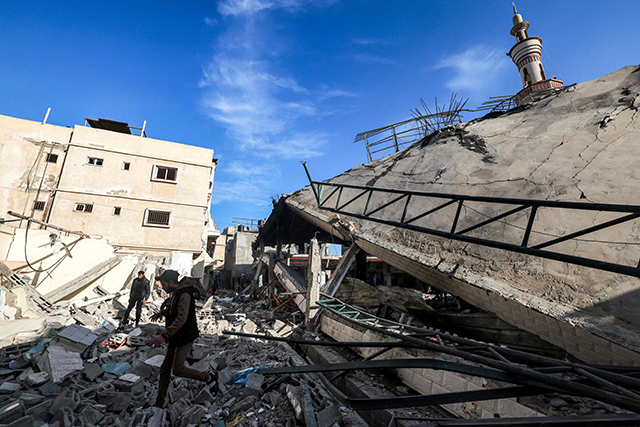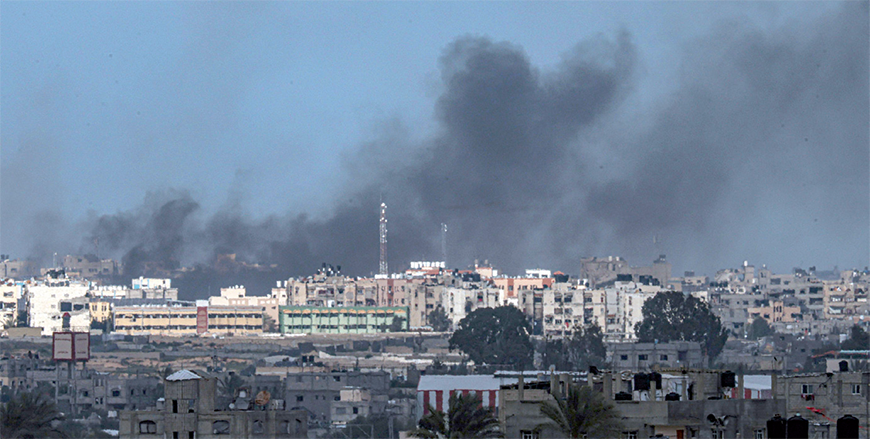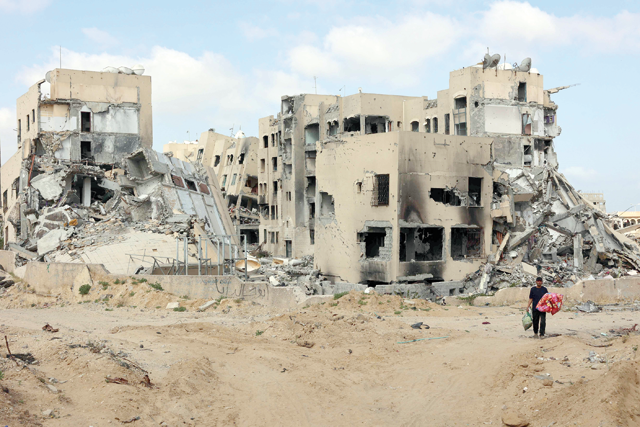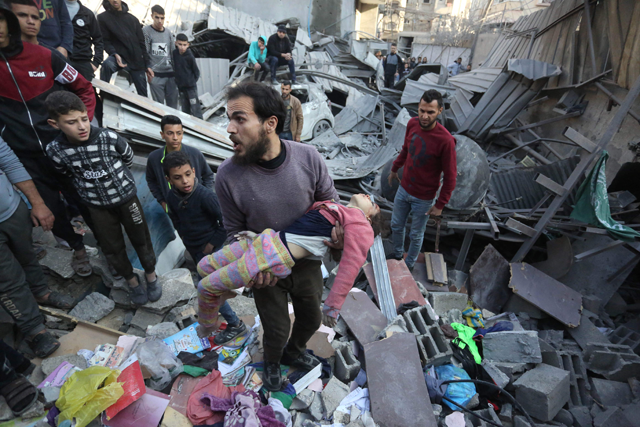You are here
Hamas joins Cairo truce talks as Israel launches Lebanon strikes
By AFP - Feb 15,2024 - Last updated at Feb 15,2024

Men walk through the rubble of a mosque that was destroyed during Israeli bombardment in Rafah in the southern Gaza Strip on Wednesday (AFP photo)
Mediators in Egypt were racing to secure a ceasefire and free the remaining hostages before Israel proceeds with a full-scale ground incursion into the Gaza Strip's crowded far-southern city of Rafah.
A Hamas source told AFP that a delegation was headed to Cairo to meet Egyptian and Qatari mediators, after Israeli negotiators held talks with the mediators on Tuesday.
Palestinian President Mahmoud Abbas urged Hamas to "quickly complete a prisoner deal, to spare our Palestinian people from the calamity of another catastrophic event".
CIA Director William Burns had joined Tuesday's talks with David Barnea, head of Israel's Mossad intelligence service, which Egyptian media said had been mostly "positive".
US National Security Council spokesperson John Kirby described the negotiations as "constructive and moving in the right direction".
Turkish President Recep Tayyip Erdogan, an outspoken critic of Israel’s conduct of the Gaza war, also arrived in Cairo on Wednesday for talks with President Abdel Fattah Al Sisi.
With regional tensions high, Israel launched strikes on Lebanon hours after fire from Lebanon wounded multiple people in northern Israel, according to medics.
The strikes in south Lebanon killed four civilians including two children and wounded nine other people, a Lebanese security source told AFP, speaking on condition of anonymity.
Since the outbreak of Israeli offensive on Gaza on October 7, more than 240 people have been killed in Lebanon, most of them Hizbollah fighters but also including over 30 civilians.
Hizbollah has traded near-daily fire with Israeli troops since the outbreak of the war in Gaza, with tens of thousands displaced on both sides of the border.
Rafah fears
The potential for mass civilian casualties in Rafah has triggered urgent appeals, even from close allies, for Israel to hold off sending troops into the last major population centre they have yet to enter in the more than four-month-old war.
Key ally the United States has said it will not back any ground operation in Rafah without a “credible plan” for protecting civilians.
Rafah — where more than 1.4 million Palestinians are trapped — is the main entry point for desperately needed relief supplies and UN agencies have warned of a humanitarian disaster if an assault goes ahead.
UN humanitarian chief Martin Griffiths said any military operation “could lead to a slaughter”.
Terrified civilians have been locked in a desperate search for safety.
“My three children were injured, where can I go?” Dana Abu Chaaban asked at the city’s border crossing with Egypt, where she was hoping to be allowed across with her bandaged-up sons.
Pressure has grown on Egypt to open its border to Palestinian civilians, hundreds of thousands of whom have sought shelter in makeshift camps by the border where they face outbreaks of disease and a scarcity of food and water.
“For 100 days we enter the crossing and beg them to let us cross, or to do anything to help us,” Habiba Nakhala said.
US President Joe Biden has said civilians in Rafah “need to be protected”, calling them “exposed and vulnerable”.
But Israeli prime minister Benjamin Netanyahu has stood firm and said that “complete victory” cannot be achieved without the elimination of Hamas’s last battalions in Rafah.
‘Critically important’
As the truce talks go on in Cairo, the Israeli forces kept up its bombardment of Gaza, with strikes on both Rafah and the southern city of Khan Yunis, where there has been heavy fighting.
The health ministry in the Hamas-run territory said on Wednesday that 104 people had been killed overnight.
The World Health Organisation sounded a warning on Wednesday about an under-siege hospital in Khan Yunis, which it said it had been unable to contact for weeks.
“Civilians have been called to evacuate, which is extremely dangerous,” Rik Peeperkorn, the representative for the UN agency in the occupied Palestinian territory, told reporters.
Requests to assess and restock the hospital with medical supplies had been denied, he said, adding that “without support... this hospital might become non-functional too”.
Peeperkorn said Nasser was “a key hospital for all of Gaza. We cannot lose that hospital... this hospital is critically important”.
‘Terrible hell’
Some Gazans in Rafah were already packing up their belongings in readiness to move but others vowed to stay put, fearing even greater misery in the bombed out hometowns they fled.
But there are mounting fears about food supplies and starvation across other parts of Gaza.
Ahlam Abu Assi said she “would rather die” in Rafah than return to the famine-like conditions facing relatives who stayed in Gaza City.
“My son and his children have nothing to eat. They cook a handful of rice and save it for the next day,” she told AFP. “My grandson cries from hunger.”
Related Articles
GAZA STRIP, Palestinian Territories — Israel launched a new wave of deadly strikes on southern Gaza on Thursday after vowing to push ahead w
GAZA STRIP, Palestinian Territories — Talks resumed in Egypt Saturday aimed at halting months of war in Gaza between Hamas militants and Isr
GAZA STRIP, Palestinian Territories — Fighting raged on Saturday across Gaza, where displaced Palestinians said they were "exhausted" with n














